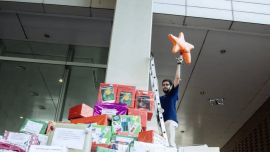Key leaders from the ruling coalition are set to swallow their pride and reunite on Argentina’s Independence Day in an attempt to throw their support behind Sergio Massa’s presidential hopes.
Following a soft launch – in-part forced by the last-minute negotiations that forced rivals to step aside at the last minute – of the Unión por la Patria presidential slate for the August PASO primaries, movers and shakers within the ruling coalition are keen to present a stronger image of unity as polling day nears.
The coalition’s three key leaders – Massa, President Alberto Fernández and Vice-President Cristina Fernández de Kirchner – are considering appearing together this Sunday (July 9) in Salliqueló, Buenos Aires Province, to mark the formal inauguration of the Néstor Kirchner gas pipeline, a key piece of energy infrastructure that will revolutionise Argentina’s gas supply.
Government sources confirmed on Thursday that the trio would appear together at the event.
Massa and Fernández de Kirchner last appeared together on June 23, but the former president offered anything but an image of unity, detailing the complex negotiations that ended in Argentina’s economy minister announcing a run for the Casa Rosada backed by his running-mate, Cabinet Chief Agustín Rossi.
She also implicitly criticised Fernández, accusing him of taking spaces on party lists that should have gone to wannabe candidate Daniel Scioli, who eventually pulled out of the race. The vice-president and president have not seen each other since June last year at an event celebrating the 100th anniversary of the founding of state energy firm YPF.
Massa, as a key Cabinet member, has regular meetings with Fernández, while he maintains a fluid dialogue with Fernández de Kirchner.
Speaking on Thursday at an event promoting a state housing programme, Fernández called on voters "not to forget to support" Massa at the ballot box, arguing that an opposition victory would lead to a tragedy for the nation.
Line up in line
As the race for the presidency ramps up – and with the ruling coalition trailing the opposition in the polls – key figureheads and sectors of the ruling coalition are now beginning to get in line behind Massa.
Interior Minister Eduardo 'Wado' de Pedro, the man who withdrew his candidacy in order to make way for Massa, has been appointed as the economy minister's campaign chief, it emerged this week.
Even international supporters are getting in on the act – Massa met with Luiz Inácio Lula da Silva while attending the two-day Mercosur summit in Puerto Iguazú. The Brazil president subsequently invited the presidential hopeful to Brasília.
On Tuesday, Massa and Rossi met allied governors for a meeting of the Federal Investment Council. Shepherded by De Pedro, representatives from 11 provinces governed by Peronist leaders turned out to show their support and pose for a photograph in an attempt to project unity.
Pro-government leaders of social movements and picketers groups are also starting to voice their support for Massa.
Barrios de Pie leader Daniel ‘Chuky’ Menéndez is among those who have declared their backing for the unity ticket, though the group has also expressed its “value” of Massa’s nominal rival for the ruling coalition’s candidacy, Catholic social leader Juan Grabois.
In a statement, Barrios de Pie said that it is necessary for the government to “retain the national government” and that Massa is the “most viable option to triumph over Juntos por el Cambio.”
The Movimiento Evita, perhaps the space with the largest number of activists, is still debating its position, while the Grabois-linked Unión de Trabajadores y Trabajadoras de la Economía Popular (UTEP) has said it will not take up a shared position.
Máximo defends Massa
Perhaps the most notable voice backing Massa (bar perhaps Fernández de Kirchner) is national deputy Máximo Kirchner, who this week came to the economy minister’s defence at an event in Lanús, blaming Argentina’s economic woes on the opposition and the country’s US$44-billion debt with the International Monetary Fund.
Kirchner, Fernández de Kirchner’s son, also complained that his mother’s potential candidacy had been “banned” by the courts and warned that an opposition victory in October could lead to “tragedies” for the country’s people.
The IMF had “taken the country by the throat,” complained the lawmaker, declaring that the multilateral lender’s policies were “not against our economy minister," but “against our people, our people's education, our people's right to housing and our people's jobs."
Kirchner railed in particular against the economic legacy of Mauricio Macri's 2015-2019 term in office, arguing that the ruling coalition had been unable to “live up to the circumstances” due to the IMF debt.
"What Macrismo has done in Argentina is a disgrace, shameful, the way in which some wanted to solve it has not been the right one either,” he declared.
“The little training they have in politics, in economic matters," he said. "We need to rebuild and fight for the sovereignty of our country. This election is the one that will empower the next president to be able to defend the land of the Argentine people.
"We love our homeland, because we love our country and because we also have the firm conviction that in August and in October Peronism must win the elections to avoid more tragedies in Argentina," he said, referencing La Cámpora in national politics.
Kirchner’s backing for the main ticket was also echoed by another La Cámpora leader, Andrés ‘El Cuervo’ Larroque.
"There is not much to debate and we have to win. The formula to fight for is Massa-Rossi. Many of our colleagues share the same views," said Larroque this week.


























Comments